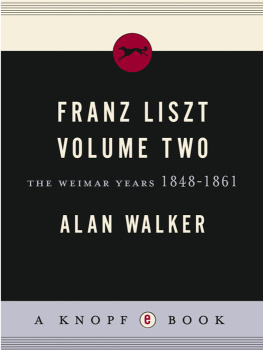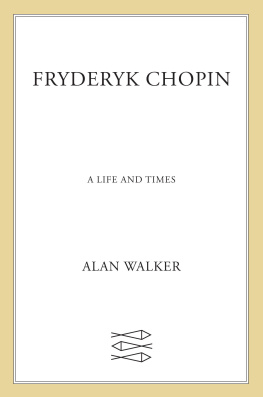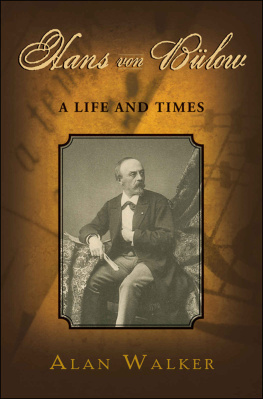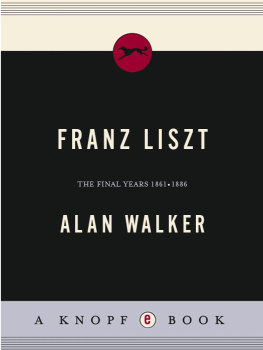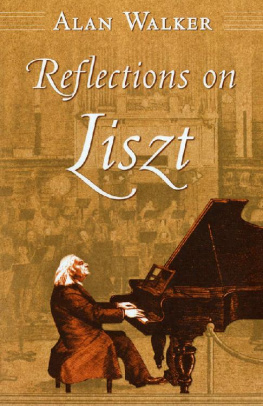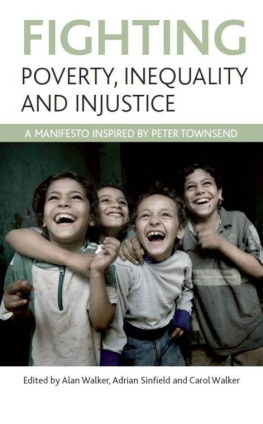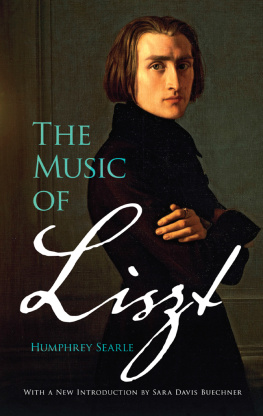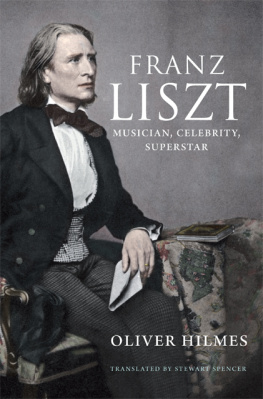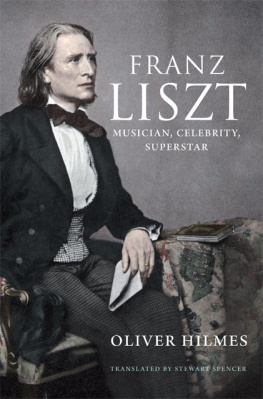THIS IS A BORZOI BOOK
PUBLISHED BY ALFRED A. KNOPF, INC.
Copyright 1989 by Alan Walker
Maps copyright 1989 by David Lindroth
All rights reserved under International and Pan-American Copyright Conventions. Published in the United States by Alfred A. Knopf, Inc., New York, and simultaneously in Canada by Random House of Canada Limited, Toronto.
Distributed by Random House, Inc., New York.
Published in Great Britain by Faber and Faber Ltd., London.
Musical examples drawn by Paul Courtenay.
LIBRARY OF CONGRESS CATALOGING IN PUBLICATION DATA
(Revised for vol. 2)
Walker, Alan [date]
Franz Liszt.
Includes bibliographies.
Contents: v. 1. The virtuoso years, 18111847
v. 2. The Weimar Years, 18481861.
1. Liszt, Franz, 18111886. 2. ComposersBiography.
I. Title.
ML 410. L 7 W 27 1983 780.924 [B] 82-47821
eISBN: 978-0-307-83044-9
FRONTISPIECE
Franz Liszt, an oil portrait by Wilhelm Kaulbach (1856).
v3.1
To Lisztians across the world,
wherever they may be, these volumes
are affectionately dedicated.
Contents
The character of Carolyne Iwanowska ~ her childhood in the Ukraine ~ her relationship with her mother and father ~ her marriage to Prince Nicholas von Sayn-Wittgenstein ~ the death of her father, Peter Iwanowsky ~ Carolyne inherits a fortune ~ the chteau Woronince ~ Liszt meets Carolyne in Kiev, February 1847 ~ he visits her in Woronince ~ he is introduced to her daughter, Princess Marie, and her husband, Prince Nicholas.
Chronicles of an adventure ~ a winter journey ~ a sojourn in St. Petersburg ~ she hears the music of Berlioz ~ growing love for Liszt ~ Carolyne and Liszt meet again in Odessa, July 1847 ~ Liszt gives his farewell concert in Elisabetgrad, September 1847 ~ the lovers of Woronince ~ Glanes de Woronince ~ Liszt sets out for Weimar ~ Carolyne leaves for Kiev to sell her estates ~ farewell to the Ukraine ~ Liszt and Carolyne are re-united at Kryzanowicz.
The seeds of the 48 revolutions ~ the awakening of Hungarian nationalism ~ Szchenyi, Kossuth, and Batthyny ~ the Hungarian war of independence ~ the evacuation of Pest ~ the victories of General Artr Grgey ~ the Hungarian Declaration of Independence ~ Pest re-taken ~ the Russian intervention, June 1849 ~ the surrender at Vilgos ~ Batthyny executed ~ Kossuth goes into exile ~ Liszt and Carolyne travel to Vienna and Eisenstadt ~ a visit to Father Albach ~ Liszts attitude to the war of independence ~ Heines poem against Liszt, Im Oktober 1849 ~ Funrailles, October 1849 ~ Liszt and Carolyne take up residence in Weimar.
A history of the Altenburg ~ the ownership of the house ~ a description of its interior ~ the household staff ~ Liszts domestic routine ~ social life at the Altenburg ~ Carolynes difficulties with the Weimar Court ~ her liaison with Liszt criticized ~ Liszt in trouble with the law: The Weimarers are all donkeys ~ the Altenburg becomes a Mecca for modern music.
Weimar in the time of Grand Duke Carl August ~ the Athens of the North ~ Goethe and Schiller ~ Liszts first visit to Weimar, November 1841 ~ he becomes Weimars Kapellmeister in Extraordinary, November 1842 ~ his fledgling attempts at conducting ~ the poor state of the Weimar orchestra and opera house ~ Liszts struggles with the bureaucracy ~ his relations with Hereditary Grand Duke Carl Alexander.
Liszt and Wagner ~ Wagner and the Dresden insurrection, May 1849 ~ Liszt performs Tannhuser and takes up Wagners cause ~ the Goethe Festival, August 1849 ~ the Herder Festival, August 1850 ~ Liszt gives the world premire of Wagners Lohengrin ~ he proposes a Goethe Foundation in Weimar ~ Wagners critique of that idea ~ Hans Christian Andersen visits Weimar ~ Liszt and the black-cloaked witch ~ Liszt on the Weimar podium.
Liszt takes stock of his position ~ he conducts Beethovens Ninth at the Ballenstedt Festival ~ a visit to Braunschweig ~ the illnesses of Princess Carolyne ~ her treatments at Bad Eilsen ~ an encounter with Clara Schumann ~ Prince Nicholas visits Weimar ~ he and Carolyne draw up a property settlement ~ Carolynes dispute with Tsar Nicholas I ~ Princess Marie is confirmed in Weimar ~ Anna Liszt visits Weimar ~ Liszts piano compositions of the early Weimar years ~ he revises the pieces of his Glanzzeit ~ Liszt and the Piano Sonata in B minor and its dedication to Schumann ~ Liszt and the Weimar organists ~ he studies the music of J. S. Bach ~ Ad nos, ad salutarem undam ~ the first Berlioz week ~ more Wagner: Der fliegende Hollnder, Tannhuser, and Lohengrin ~ Liszt complains to Carl Alexander about his working conditions ~ the death of Carl Friedrich intervenes ~ Carl Alexander ascends the throne: The Word must now become the Deed.
Liszt and his pupils ~ the Altenburg eagles ~ Hans von Blow and his special relationship to Liszt ~ an account of Blows personality ~ Carl Tausig arrives in Weimar ~ his lessons with Liszt and his subsequent career ~ the boys: Karl Klindworth, Hans von Bronsart, William Mason, and Dionys Pruckner ~ an account of their masterclasses with Liszt ~ Masons diary ~ Cornelius takes up residence at the Altenburg ~ the twenty-one steps ~ Julius Reubke and Alexander Ritter ~ Ritters championship of the New Music.
Liszt meets Raff in Basel, 1845 ~ together in the Rhineland ~ Raff arrives in Weimar, January 1850 ~ he goes to jail for debt ~ Raffs claim to be Liszts collaborator ~ his correspondence with Kunigunde Heinrich ~ the Raff question today ~ William Mason on Tasso ~ Princess Carolyne on Raff.
Agns Street-Klindworth arrives in Weimar ~ La Maras account of her re-examined ~ her connection with Liszt ~ her family background and her role in the espionage network run by her father, Georg Klindworth ~ the uncensored letters of Liszt to Agns reveal his emotional attachment to her ~ their trysts in Cologne and Berlin, 1855 ~ Agnss relationship with Ferdinand Lassalle ~ they are trailed by the secret police ~ the death of their daughter, Fernande ~ Princess Carolyne and the aftermath of the Agns affair ~ Agns dies in Paris in 1906.
The Altenburg matines ~ the Society of Murls ~ Brahms at the Altenburg ~ Liszt visits Wagner in Zrich ~ the Karlsruhe festival ~ Liszt and the Murls visit Wagner in Basel ~ Wagner reads them the Nibelungen poem ~ Liszts sojourn in Paris ~ he is re-united with his three children ~ Liszts deepening relationship with Wagner ~ the latters impecunity ~ the nature of Liszts material and artistic help ~ Liszts attempts to secure Wagners amnesty ~ Hoffmann von Fallersleben takes up residence in Weimar ~ the Rotterdam Music Festival, 1854 ~ meetings with Anton Rubinstein ~ George Eliot at the Altenburg ~ her Three Months in Weimar ~ Liszt founds the Neu-Weimar-Verein ~ its constitution and its membership ~ the second Berlioz week, February 1855 ~ a banquet for Berlioz ~ deteriorating relations with Rubinstein ~ the thirty-third Lower Rhine Festival in Dsseldorf ~ another encounter with Clara Schumann ~ Liszt and America ~ the inauguration of the Merseburg organ, September 1855 ~ Liszt conducts in Brunswick ~ Liszt conducts in Berlin ~ his Thirteenth Psalm ~ the Berlin production of Tannhuser ~ lengthening shadows.
His rehearsal methods considered ~ comparison with other conductors ~ the low quality of European orchestras in general ~ the outcast profession of musician ~ Liszts reforms on the podium ~ he directs the Karlsruhe festival and attracts criticism ~ he replies with his Manifesto on conducting ~ Liszts conducting career reviewed ~ his failures in Leipzig and Dresden ~ Liszts legacy.

